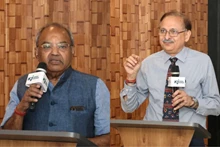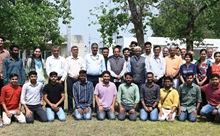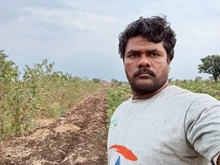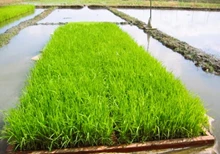
Agriculture is the backbone of Bihar's economy, employing 81 percent of the workforce and contributing approximately 42 percent of the state's gross domestic product, as per the state’s official data. Agriculture provides a living for over 76 percent of Bihar's people.
Meena Devi, 55, from Supaul's Triveniganj, has given up hope. She'd been trying unsuccessfully to buy fertiliser for the past three days. "I'm coming home without fertiliser for the third day today (Friday)." At 3 a.m., I arrived at BISCOMAUN (Bihar state cooperative marketing union limited). "I had to return empty-handed after 14 hours," she recalls, lamenting the lack of fertiliser, particularly DAP (diammonium phosphate), which is critical for the wheat crop's survival.
"Unfortunate rains ruined our paddy, and now the government is ruining our rabi hopes," she says.
Farmers in south Bihar are on edge due to an unusual fertiliser shortage during the Rabi sowing season. They have been blocking roads, throwing stones, and shouting slogans against the central government for reportedly shipping Bihar quota fertiliser to UP and Punjab to help them win the next assembly elections.
In four districts in the Shahabad region, namely Rohtas, Kaimur, Buxar, and Bhojpur, just 14 percent of the requisite DAP and 16 percent of the required urea fertilisers had been received. The granary of Bihar is the region that produces the majority of the state's paddy and wheat.
"Only 1,275.75 metric tonnes (MTs) of DAP and 4,442 MTs of urea fertiliser have been delivered in Kaimur district, against a need of 8,999 MTs and 27,000 MTs, respectively, for the Rabi season," district agriculture official Rewati Raman said, adding that 1000 MTs of DAP would arrive next week.
In this region, the Rabi planting season begins on November 15 and concludes on December 15.
Dhananjay Tiwary, a major farmer from Rampur, said the central government created a fake crisis by moving Bihar's fertiliser quota to poll-bound UP and Punjab, while the state government remained silent.
As one can expect, the shortfall has resulted in a black market.
The government cost for a 50 kg bag of DAP is set at Rs1,200, while the rate for urea is set at Rs266, according to the DAO.
Fertilizers transported from UP, on the other hand, are selling for considerably more on the illegal market. Farmer Bajarangi Singh of Bhagwanpur stated the needed quantity of DAP and urea was available on the illegal market for Rs1500 and Rs350 per bag, respectively.
According to Singh, the agricultural department was only providing one farmer with two bags of fertiliser. Because the land was rapidly drying, farmers had no choice except to buy fertiliser on the illicit market in order to seed wheat on time.
In Darbhanga, the fertiliser shortage has hampered the seeding of rabi crops. "For starters, fertilisers like DAP (diammonium phosphate) and potash are difficult to come by. If it is still available, the costs have risen dramatically. "We can't afford to buy fertilisers at exorbitant prices," says Hemchandra Singh, a farmer in Hayaghat block.
Many farmers in the Kushothar panchayat of the Bahadurpur block claim that a slew of unauthorised fertiliser, seed, and pesticide stores have sprung up in the area recently.
"We have asked concerned officials to keep a close eye on fertiliser dealers in the district due to the shortage and illegal marketing of fertilisers," Darbhanga district magistrate Thiyagrajan SM stated.
Fertilizer shortages have also affected the Seemanchal region, where farming is the main source of income for around 85% of the population.
'We have been racing from shop to shop, but we cannot acquire DAP fertiliser urgently necessary for wheat sowing,' Sunil Kumar Jha, 45, of Japharpur hamlet in Purnia said.
Officials from the Agriculture Department, on the other hand, claim that the issue will be over shortly, and that DAP supply has even resumed. Purnia district agriculture officer Prakash Chandra Mishra said, "At the same time, we are asking the farming community to employ different ways so that rabi crops are not impacted."











